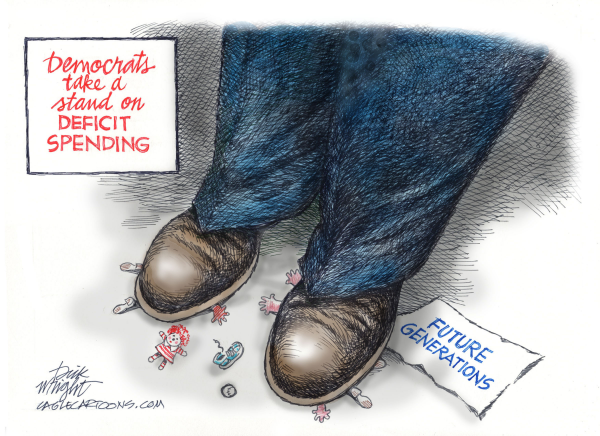
The national debt broke the $32 trillion barrier this week.
It’s a number so huge it’s incomprehensible to the average citizen.
We knew $32 trillion was coming.
It just got here a lot faster than the money experts thought, thanks to the roughly $5 trillion that the feds spent to help people and businesses withstand the many blows inflicted by Covid-19 and lockdowns.
If you are a good citizen who’d like to gift a few bucks to the federal government to help pay down the national debt, you need to know the good news and the bad.
The first bit of good news is that there’s an obscure old government program designed to help you do just that.
In 1961 the Bureau of the Public Debt — part of the Treasury Department — began allowing donations that directly reduce the debt.
According to Title 31, Chapter 31 of the U.S. Code, any citizen is free to give a “gift” to Treasury, under the condition that the money will be used only to pay down the debt.
The second bit of good news, reports MSN, is that in 2022 a number of unknown individuals gifted $1 million to Uncle Sam.
The bad news is, though, is really bad — our debt is at $32 trillion. Broken out into $1 million dollar increments, that is 32 million-million dollars!
Forbes reports that the debt is so large that two of the world’s richest men, Elon Musk and Jeff Bezos, couldn’t put a dent in it.
Their net worth is $340 billion. If all their vast wealth was donated to debt reduction, our debt would go from 32,000 billion dollars to 31,660 billion dollars!
In other words, there really is no point in gifting money to a dead-end cause.
Still, lots of good-hearted Americans have been giving money to Washington for centuries.
According to a fascinating discussion on NPR, the earliest gift dates back to the Madison Administration in 1811, when a random citizen mailed in five dollars.
Though there was not yet any formal program to process such gifts, other citizens kept on sending money in.
In 1843, continues NPR, the government set up a gift fund as a general all-purpose account. People donated checks, bags of pennies and even bags of gold!
Matt Garber, of the Bureau of Fiscal Service, said that in one instance $63 in gold bullion was gifted.
In the 1950s, he continued, “patriotic Americans wanted to help the government pay back the money it had borrowed for war efforts.”
That’s why, in 1961, the government established a special account specifically for the purpose of reducing the national debt.
Though the Bureau keeps no official records on this program, a senior advisor shared some interesting anecdotes with me in 2010.
She said gift-givers generally mail in their checks with no notes attached. Others sign over their tax-refund checks and in 1992 someone gave $3.5 million from their estate.
The record for the largest gift came in 1994 from anonymous donor — $12 million.
As the debt continues to balloon, fewer Americans are gifting money to pay it down.
But who can blame them?
If our debt remained fixed at $32 trillion and we applied the roughly $1 million donated every year to pay down the debt, we’d pay it off in exactly 32 million years!
Purcell, creator of the infotainment site ThurbersTail.com, which features pet advice he’s learning from his beloved Labrador, Thurber, is a Pittsburgh Tribune-Review humor columnist. Email him at Tom@TomPurcell.com.
Comments are not available on this story. Read more about why we allow commenting on some stories and not on others.
We believe it's important to offer commenting on certain stories as a benefit to our readers. At its best, our comments sections can be a productive platform for readers to engage with our journalism, offer thoughts on coverage and issues, and drive conversation in a respectful, solutions-based way. It's a form of open discourse that can be useful to our community, public officials, journalists and others.
We do not enable comments on everything — exceptions include most crime stories, and coverage involving personal tragedy or sensitive issues that invite personal attacks instead of thoughtful discussion.
You can read more here about our commenting policy and terms of use. More information is also found on our FAQs.
Show less